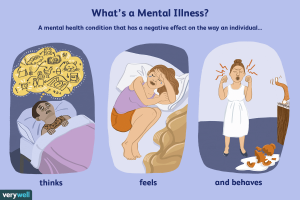Mental Health and Strategies for Stress Management
Mental health is an essential component of overall well-being. It is just as important as physical health, but often overlooked. One of the most significant contributors to poor mental health is stress. In this article, we will discuss the importance of mental health and strategies for stress management.
Importance of Mental Health
Mental health refers to your emotional, psychological, and social well-being. It affects how you think, feels, and behave in your daily life. Maintaining good mental health is important for overall well-being, productivity, and quality of life. Poor mental health can lead to depression, anxiety, and other mental health disorders.
Stress and Mental Health
Stress is a natural response to challenging situations, but prolonged or chronic stress can have negative effects on mental health. It can lead to anxiety, depression, and other mental health disorders. Chronic stress can also lead to physical health problems such as high blood pressure, heart disease, and obesity.

Strategies for Stress Management
- Identify Triggers: Identify the things that trigger stress in your life. This may include certain people, situations, or events. Once you have identified your triggers, you can take steps to avoid or manage them.
- Practice Relaxation Techniques: Relaxation techniques such as deep breathing, meditation, and yoga can help to reduce stress and promote relaxation.
- Exercise Regularly: Exercise is an excellent way to reduce stress and improve mental health. It helps to release endorphins, which are natural mood boosters.
- Eat a Healthy Diet: Eating a healthy, balanced diet can help to reduce stress and improve overall mental health. Avoid processed foods and sugar, which can contribute to stress and anxiety.
- Get Enough Sleep: Getting enough sleep is essential for mental health and stress management. Aim for 7-9 hours of sleep per night and establish a consistent sleep schedule.
- Connect with Others: Social support is essential for good mental health. Connect with friends and family, join a support group, or seek professional help if needed.
- Set Realistic Goals: Setting realistic goals and breaking them down into manageable tasks can help to reduce stress and increase productivity.
What are the signs that your mental health is improving?
Improving mental health can manifest in different ways for different people, but here are some common signs that your mental health is improving:

- Increased Energy: When you are feeling mentally healthy, you will often experience a sense of increased energy and motivation. You may feel more willing to take on tasks and engage in activities that you previously found difficult or exhausting.
- Improved Sleep: Improved mental health can lead to better sleep quality and quantity. You may find that you are falling asleep more easily and waking up feeling more rested and refreshed.
- Reduced Anxiety: When your mental health is improving, you may notice a reduction in anxiety symptoms. You may feel less worried, fearful, or nervous in situations that previously caused you distress.
- Increased Focus: Improved mental health can also lead to better focus and concentration. You may find it easier to complete tasks or stay on track with goals and responsibilities.
- Improved Relationships: When you are feeling mentally healthy, you may find that your relationships with others improve. You may feel more open and comfortable communicating with others and may experience more positive interactions.
- Increased Resilience: As your mental health improves, you may find that you are more able to cope with challenges and setbacks. You may feel more resilient and better equipped to handle stressors.
- Positive Self-Talk: When your mental health is improving, you may find that you are more kind and compassionate towards yourself. You may be more likely to engage in positive self-talk and to challenge negative beliefs and thoughts.
Conclusion
Mental health is just as important as physical health, and stress is a significant contributor to poor mental health. By identifying triggers, practicing relaxation techniques, exercising regularly, eating a healthy diet, getting enough sleep, connecting with others, and setting realistic goals, you can manage stress and improve your overall mental health. Remember, taking care of your mental health is essential for living a happy, healthy, and productive life.











